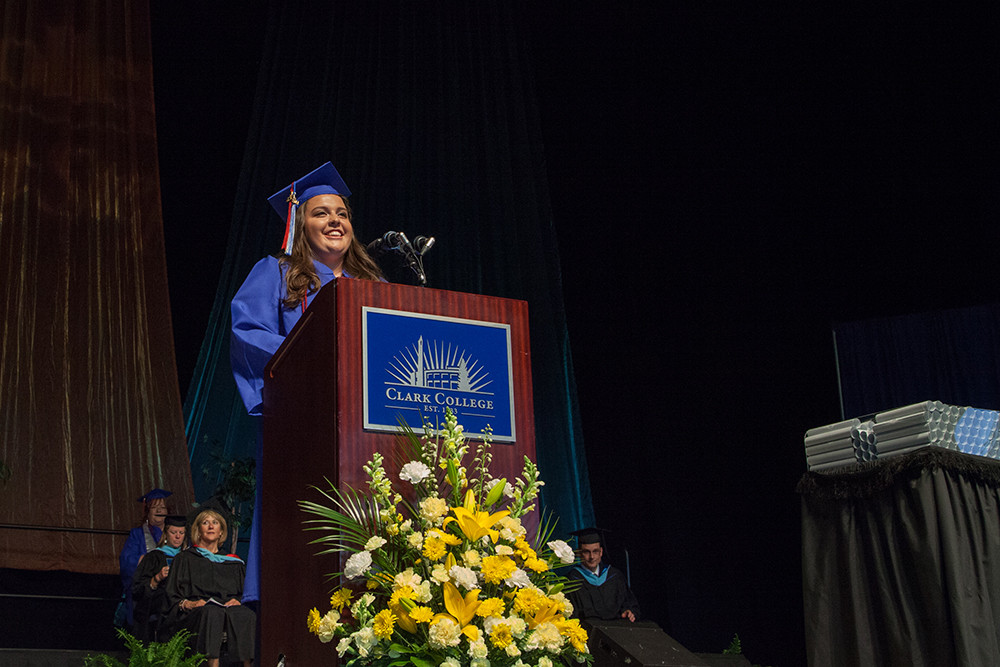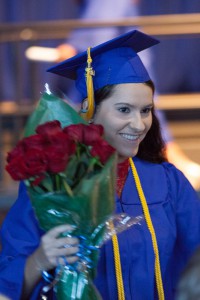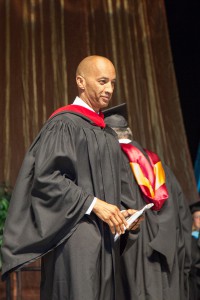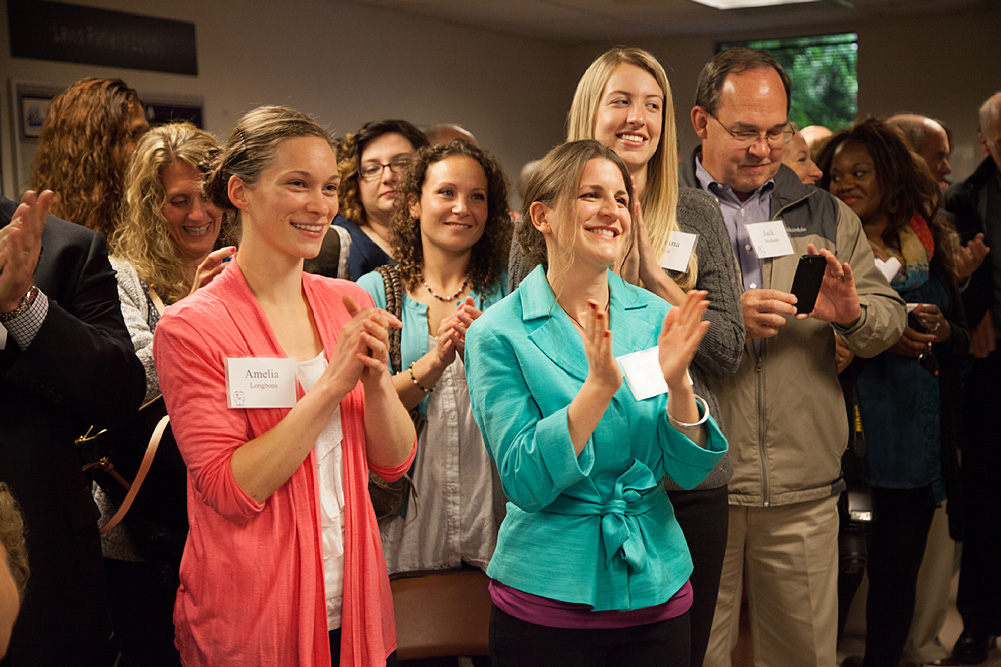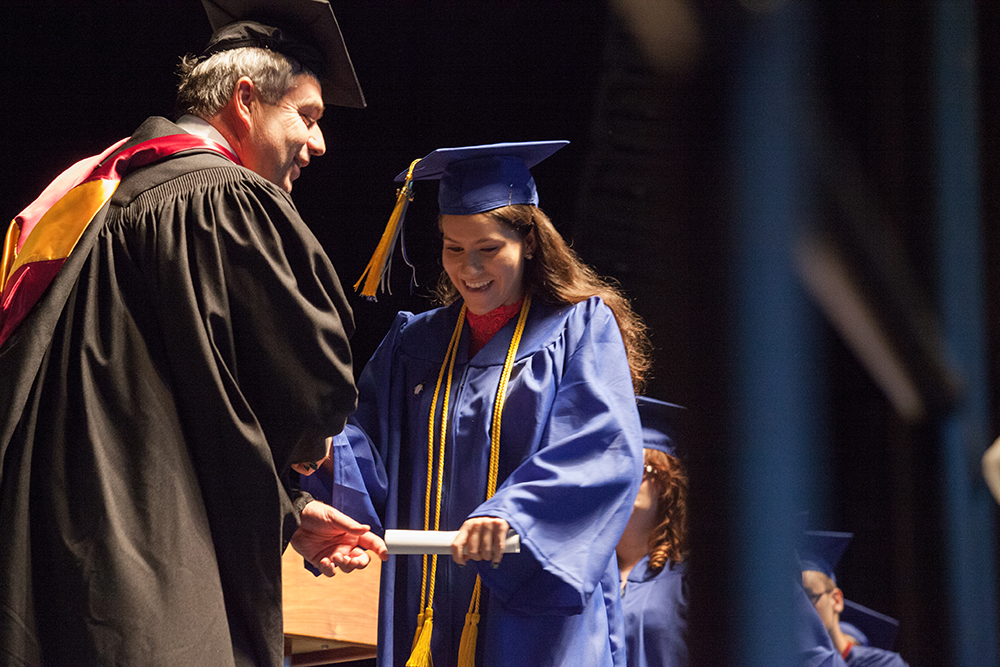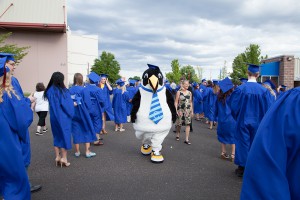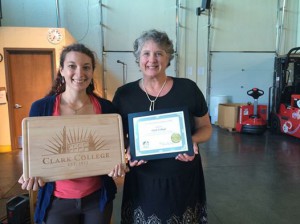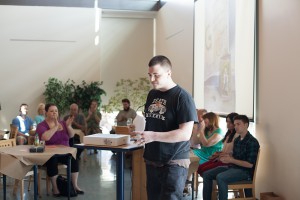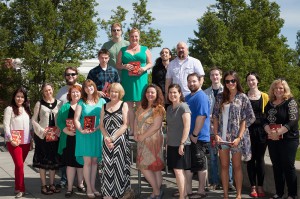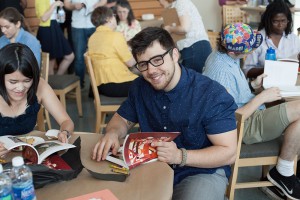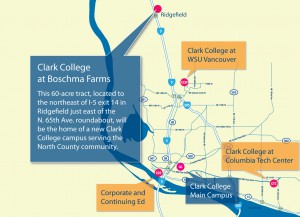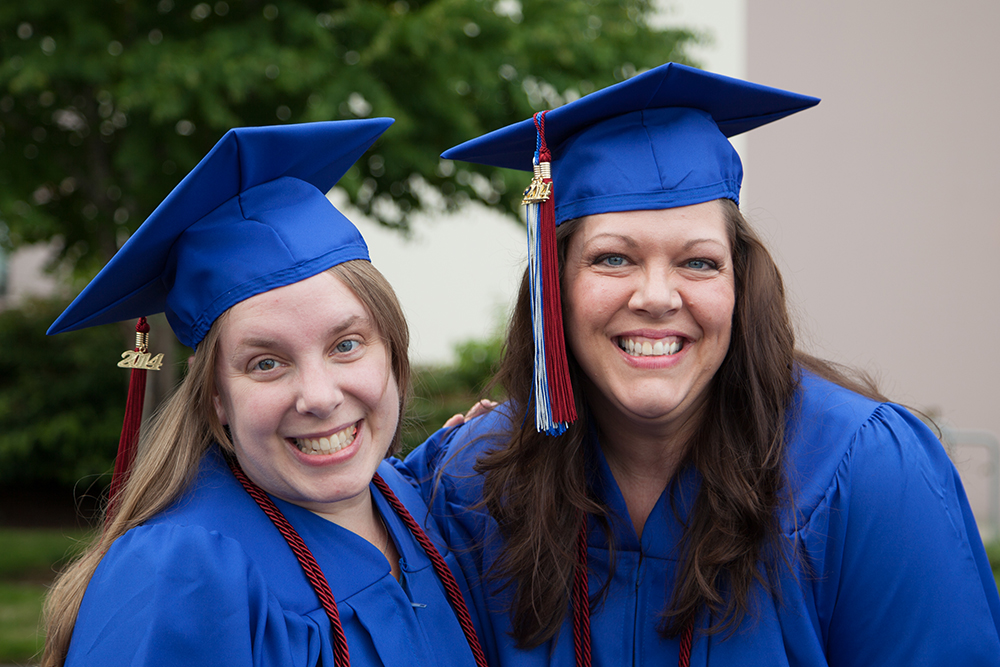
Jaime Taylor and Susan Baker
Susan Baker and Jaime Taylor had to arrive at the Sleep Country Amphitheater before 6 p.m. to get their spots near the head of the line of graduates waiting for the Clark College commencement ceremony’s 7 p.m. start. But for both women, the wait for this moment was much longer than an hour.
“I started this journey in 1995,” said Baker, who works as a teacher in the college’s Child & Family Studies department. “And then I had children, and I had to put things on hold for a while, but now here I am!”
Taylor–who, like Baker, was graduating with honors with an Associate of Applied Science degree in Early Childhood Education (ECE)–told a similar story. “It was kind of my time,” she explained about her choice to enroll at Clark, where she worked in Baker’s classroom as part of her studies. “My kids had gone to school and it was time for me to do something for myself.”
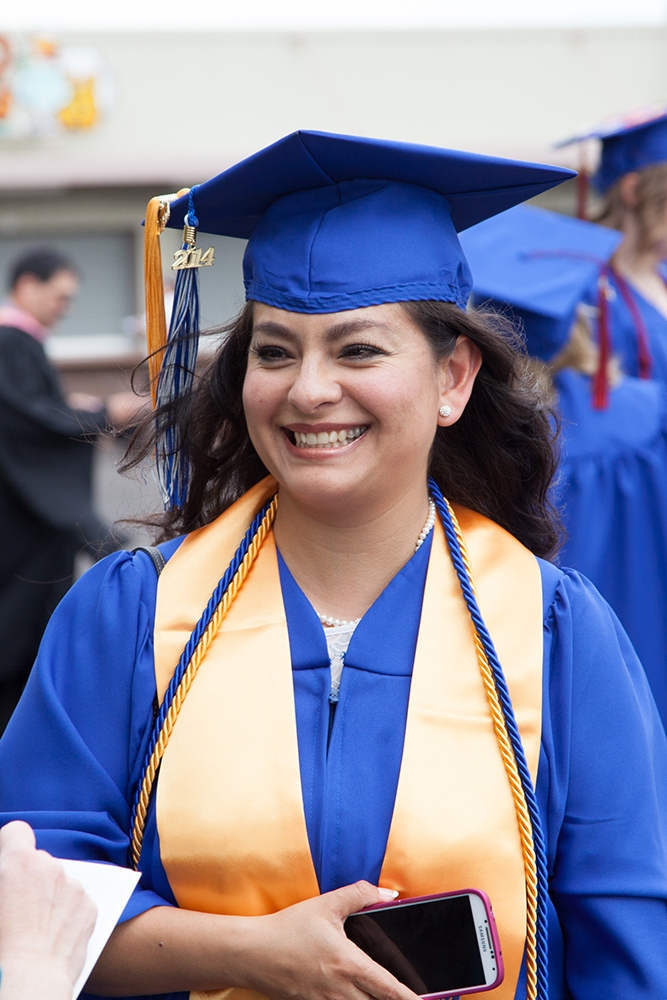
Judith Gomez
All along the line, there were tales of dreams deferred. Judith Gomez–also among the ECE contingent at the head of the line–first began taking classes in Clark’s non-credit English as a Second Language program 16 years ago, soon after she moved to Vancouver from her native Mexico. At the time, she spoke no English, but she was determined to go to college. She had to drop out twice when she had children, but eventually she was able to improve her English skills to the point that she could take for-credit classes.
“English isn’t my first language, so for me, doing papers was double the work,” she said, beaming under her blue mortarboard cap, from which dangled the golden tassel and insignia of Phi Theta Kappa, the honor society for two-year colleges. “But I was determined, and my teachers were amazing, so supportive.”
Gomez, who also works in Child & Family Studies as an early-intervention specialist, said she hoped her children–ages 19, 14, and10–would follow in her footsteps to pursue college educations. “In ECE, we call it ‘modeling,'” she said. “You model the right behavior, and the children see it and learn. My children are so excited already. They’re all talking about going to college.”
Kevin Ross was also hoping to being role model. “I am the first one from my whole family to graduate from college,” he said as he waited to receive his Associate in Applied Technology in degree in Supervisory Management. “We’re talking parents, grandparents, brothers, sisters, aunts, uncles, cousins. It feels good–it feels great. It gives my family members something to see. … I have a little brother. I want to set an example for him, to show him that you can succeed, no matter where you come from or what’s happened in your life.”
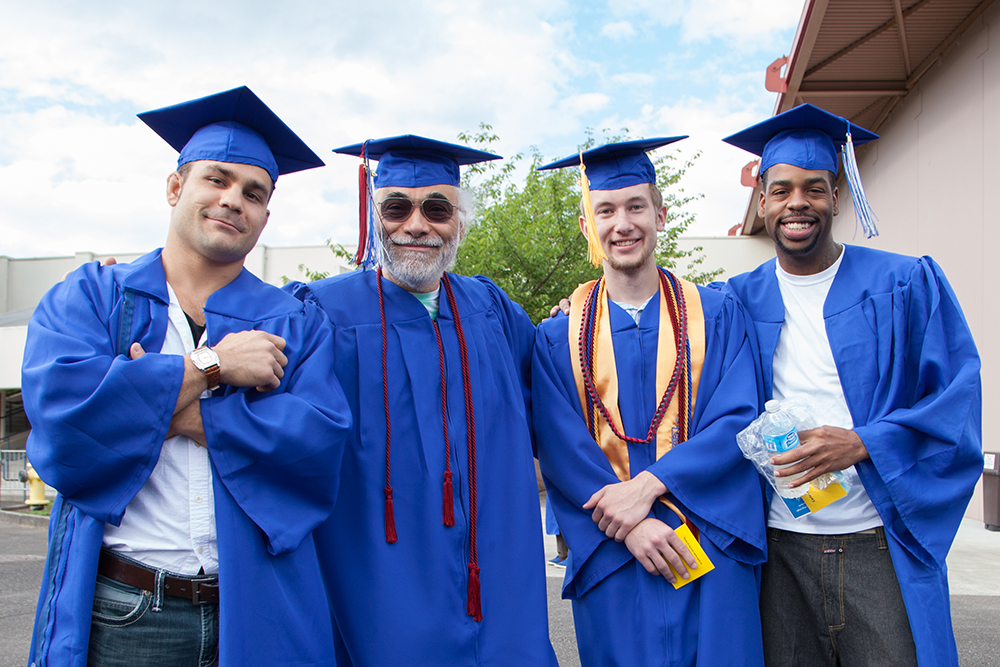
Juliab Dutkel, Carlos Cervantes, Gregory Michael, and Kevin Ross
For Ross, life has not always been peaceful. He first started thinking about attending Clark when he was incarcerated at Larch Corrections Center. He got to know Clark College President Bob Knight, who regularly visits the center to play basketball with inmates. “As I approached my time to come out [of Larch], Bob started asking me, ‘What are you going to do next? You should come to Clark,'” Ross recalled. “So I went to Clark. It’s offered me an alternate route toward success.”
Ross said he plans to transfer to WSU Vancouver to pursue a bachelor’s degree in business. He will not be the first former inmate to do so–in fact, Clark College has long run an educational program within Larch, and on the Friday following commencement, a ceremony within the correctional facility’s walls would celebrate the 34 inmates who earned their High School Equivalencies during this academic year.
Standing next to Kevin Ross was Carlos Cervantes, whose cap sat atop a long mane of curly gray hair. Cervantes came to Clark when the housing-market crash put an end to his career as a Realtor. He was graduating with a degree in Paralegal, despite having suffered financial hardships after losing his job.
“I was really struggling, but I got scholarships,” Cervantes said. “The Clark College Foundation made my education possible.”
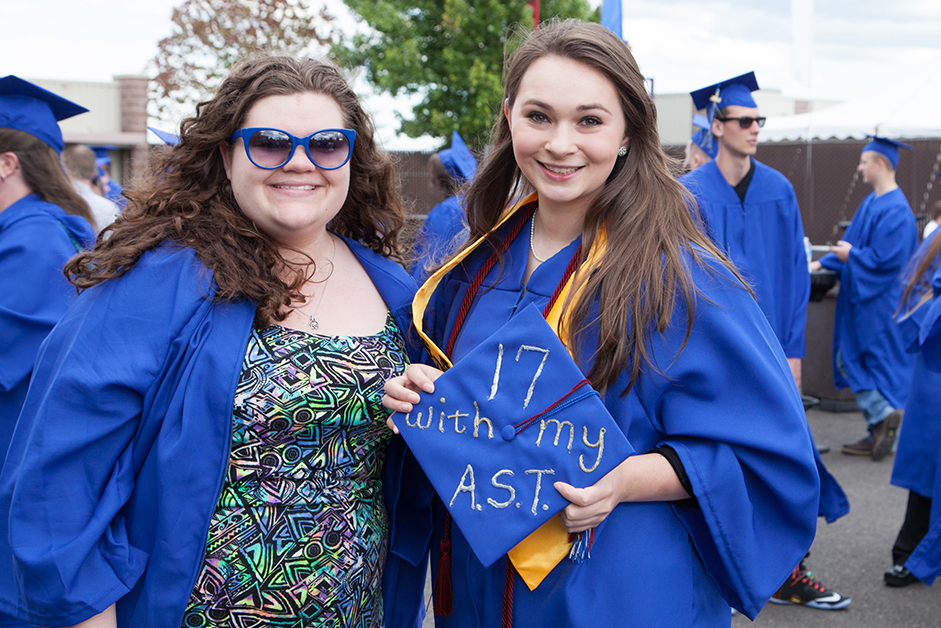
Katie Brilz and Lacey Mac-Rhyann
For other graduates, this commencement wasn’t a dream deferred–rather, it was a dream accelerated. Lacey Mac-Rhyann had decorated her cap with the slogan “17 with my AST.” Mac-Rhyann was one of the 235 graduates who participated in Running Start, a Washington State program that allows students to take college classes while still enrolled in high school. “It was the most phenomenal thing,” she said of the program. “It didn’t just give me college credit–it gave me college experience.”
Ana Lai, who had decorated her cap with pictures of scientific equipment and the logo of University of Washington, also appreciated being part of Running Start. “It gave me a head start,” said the Ft. Vancouver High student, who plans to become a mechanical engineer. “I did the calculus and physics sequences, and I loved it.”

Ana Lai
Alecsander Thompson, who attended Evergreen High School, said he appreciated the serious atmosphere he experienced at Clark through Running Start. “In high school, you don’t pay to get an education,” he said. “In college, people are there because they want to learn.”
Thompson was standing next to his friend Mark Hamilton, also a Running Start student from Evergreen, and who like Thompson plans on transferring to Portland State University’s criminal justice program. Another thing the two young men had in common was that they originally chose Running Start in part because Clark’s schedule offered them the flexibility to work full-time while attending school.
“You kind of cut out sleeping after a while,” laughed Hamilton.
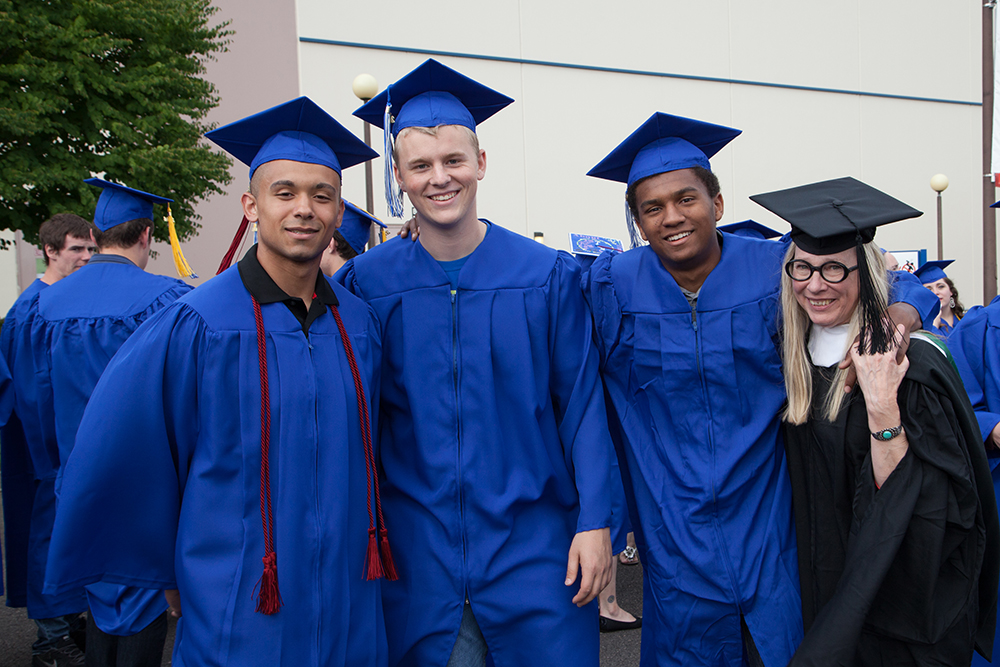
Timothy Witcher, Alecsander Thompson, Mark Hamilton, and English instructor Kate Scrivener.
As the bagpipes began to sound, the graduates quickly adjusted caps and gowns in preparation for their procession. This was the moment that would make all of it–the sleeplessness, the studying, the doubts and fears–worthwhile. Near the front of the line, Susan Baker got ready to complete the journey she’d begun almost 20 years earlier.
“You know, when you’re a mom, you spend so much time telling your kids that you’re proud of them,” she said. “It’s pretty cool to be hearing my kids tell me they’re proud of me.”
Photos: Clark College/Jenny Shadley. More photos of graduates are available in the college’s Flickr album.






